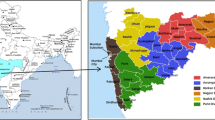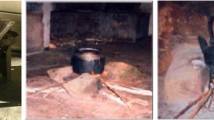Abstract
Many remote communities still rely on wood, charcoal, or biomass for cooking. This is unthinkable in the developed world considering how these traditional forms of cooking are exacerbating gender inequality, education gap, and even causing premature deaths through the indoor air pollution. These severe negative impacts resulting from open-fire cooking constitute the infamous cooking problem. Yet, many people, both in the developed and developing countries, still lack awareness of the problem and its urgency. This is one of the factors why people have not transitioned to clean cookstoves , despite their availability in the developing market. This chapter elaborates on the cooking problem and its impacts on the remote communities and the society. Subsequently, some of the technologies that can and have been replacing traditional cookstoves are listed. Realising that simply having the technology is not enough, this chapter provides a detailed discussion on what could be done in order to transition the biomass cookstove users to use clean cookstove sustainably through human-centred design perspective for the case of Indonesia.
Access this chapter
Tax calculation will be finalised at checkout
Purchases are for personal use only
Similar content being viewed by others

Notes
- 1.
Masak Bersih (MASIH), or Clean Cooking in English, is a social enterprise that focuses on clean cooking problem in rural Indonesia. MASIH aims to educate these rural communities on the benefits of shifting away from open wood burning and provide affordable financing options to purchase clean cookstoves that can reduce the impact of wood burning or that utilise alternative fuel options: https://d-prize.org/winners/profiles/2018/11/29/masih.
- 2.
Yayasan Dian Desa is also the home to the Indonesia Clean Cookstoves Alliance, whose working principle is to spread the use of appropriate technology to provide sustainable solutions for development throughout Indonesia: http://www.diandesa.org/.
References
Putti V, Tsan M, Mehta S, Kammila S (2015) The state of the global clean and improved cooking sector. Global Alliance for Clean Cookstoves, Washington DC
Statista (2019) Unit shipments of electric/gas cooking appliances in the US from 2007 to 2017
Wong C (2015) International encyclopedia of the social & behavioral sciences, 2nd edn
The World Bank (2013) Indonesia—toward universal access to clean cooking Washington
Bhojvaid V et al (2014) How do people in rural India perceive improved stoves and clean fuel? Evidence from Uttar Pradesh and Uttarakhand. Int J Environ Res Public Health 11(2):1341–1358
Bruce N, Perez-Padilla R, Albalak R (2000) Indoor air pollution in developing countries: a major environmental and public health challenge. Bull World Health Organ 15
The World Bank (2014) Cleaner cook stoves for a healthier Indonesia. Yogyakarta
Thoday K, Benjamin P, Gan M, Puzzolo E (2018) The mega conversion program from kerosene to LPG in Indonesia: lessons learned and recommendations for future clean cooking energy expansion. Energy Sustain Dev 46:71–81
Energy Sector Management Assistance Program (ESMAP) (2016) Indonesia clean cooking: ESMAP supports innovative approaches to build the local cookstoves market. Helps Increase Access
The World Bank (2014) Indonesia: Government will provide universal access to clean cooking practices. Jakarta
Gunther M (2015) These cheap, clean stoves were supposed to save millions of lives. What happened. Washington Post
Cheney C (2017) Can these ‘stovers’ finally crack the clean cooking problem? Devex
International Energy Agency (2006) Energy for Cooking in Developing Countries. In World Energy Outlook 2006. OECD Publishing, Paris, pp 419–445
Shafer M (2019) Stupid stoves: why rebranding won’t solve the clean cooking alliance’s problems. NextBillion
Muller C, Yan H (2018) Household fuel use in developing countries: review of theory and evidence. Energy Econ. 70:429–439
Goldemberg J, Johansson TB, Reddy AKN, Williams RH (2004) A global clean cooking fuel initiative. Energy Sustain Dev 8(3):5–12
Clinton H, Investing in women will drive growth. The Sydney Morning Herald, Mar-2011 [Online]. Available: https://amp.smh.com.au/business/investing-in-women-will-drive-growth-20110308-1bmhe.html. Accessed 14 Jul 2019
IDEO.org, What is human-centered design? [Online]. Available: https://www.designkit.org/human-centered-design. Accessed 01 Dec 2019
Author information
Authors and Affiliations
Corresponding author
Editor information
Editors and Affiliations
Rights and permissions
Copyright information
© 2020 Springer Nature Switzerland AG
About this chapter
Cite this chapter
Diagnestya, T., Yap, J.C.W. (2020). Sustainable Cooking: Beyond the Cooking Problem with the Lens of Human-Centred Design. In: Gandhi, O., Srinivasan, D. (eds) Sustainable Energy Solutions for Remote Areas in the Tropics. Green Energy and Technology. Springer, Cham. https://doi.org/10.1007/978-3-030-41952-3_2
Download citation
DOI: https://doi.org/10.1007/978-3-030-41952-3_2
Published:
Publisher Name: Springer, Cham
Print ISBN: 978-3-030-41951-6
Online ISBN: 978-3-030-41952-3
eBook Packages: EnergyEnergy (R0)



